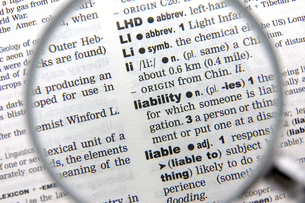Home > Resources > What Is Liability?
What Is Liability?

“Liability” refers to being held legally responsible. There are also various forms of civil liability. In personal injury law, for example, liability might arise in your favor due to an injury that you suffered. Typically, but not always, this means that the defendant who bears the liability acted in a manner that caused your injury.
Understanding liability and how it can affect a personal injury case is crucial to recovering compensation for injuries.
Table of Contents
- Damages
- Types of Liability
- A Houston Personal Injury Lawyer Can Help You Recover Compensation from Laible Parties
Damages

In personal injury law, the term “damages” refers to money that a defendant is obligated to pay as an accident victim as a consequence of their liability.
Texas law generally recognizes three types of damages:
- Economic damages: Easy-to-count losses such as medical bills, lost earnings, diminished earning capacity, property damage, etc.
- Noneconomic damages: Intangible harms such as pain and suffering, emotional distress, mental anguish, PTSD, anxiety, etc.
- Punitive damages: Additional damages designed to punish the defendant for fraud, malice, or gross negligence and deter similar conduct in the future
Courts only occasionally award punitive damages, while noneconomic damages typically add up to more than economic damages.
A skilled personal injury attorney can help you recover the full damages you’re entitled to for your injuries after a personal injury accident.
Types of Liability
The following are explanations of the main forms of personal injury liability in Texas.
Negligence
Negligence liability is the most commonly asserted basis for liability in Texas. Car accident claims are the most common negligence claims.
Every competent adult is expected to behave as carefully as a “reasonable person” would. A reasonable person would never discard a banana peel on the sidewalk, for example, or run a red light.
To prevail in a negligence claim, you must establish the following legal elements:
- The defendant owed you a duty of care
- The defendant failed to meet the demands of their duty of care
- You suffered damages
- The defendant’s breach of duty was the cause of your injury
You must prove all of these elements to qualify for damages.
Intentional Torts
Intentional torts include assault, battery, and false imprisonment, for example. If you swing your fist at someone, for example, it’s probably assault. If you connect with their jaw, it’s a battery. If you lock them in their bathroom to prevent them from calling the police, it’s false imprisonment. Intentional torts are often strong candidates for the imposition of punitive damages.
Strict Liability
In a “strict liability” claim, you don’t have to prove fault to win. Strict liability can apply in various personal injury cases.
A product liability claim arises when someone suffers an injury due to a defective and unreasonably dangerous product, such as a dangerous prescription drug. You can win a product liability lawsuit without proving fault. For example, you can sue a drug distributor for a manufacturing defect.
Texas defines “ultrahazardous” activities to include:
- Operating certain types of heavy machinery
- Blasting and storing explosives
- Disposing of hazardous waste
- The production or containment of radioactive emissions
- Working with high-voltage electricity
Those who engage in such activities essentially insure the public against any injuries they cause.
In Texas, simply keeping a dog does not subject the owner to strict personal injury liability the way it does in many other states. Keeping a wild animal, such as a chimpanzee, however, does subject the owner to strict liability for any injuries. Owning a kangaroo, for example, is legal in Texas, but you are still subject to strict liability if it hurts anyone.
Vicarious Liability
Vicarious liability is unique–it refers to holding Party A liable for the consequence of Party B’s misconduct.
Under the ancient legal doctrine of respondeat superior, you can sue an employer for the consequences of their employee’s misconduct. This remains true as long as the employee was acting within the scope of their employment at the time of the accident.
A Houston Personal Injury Lawyer Can Help You Recover Compensation from Laible Parties
Many personal injury lawyers work on a contingency fee basis. This allows accident victims to secure excellent legal representation without taking on an upfront financial burden. If you lose your case, you’re not required to pay your attorney’s fees. Instead, your attorney will only receive payment if you recover compensation through a settlement or verdict award.
Don’t delay getting the help you need to understand liability and hold the at-fault party accountable. Hiring a personal injury attorney can increase your chances of recovering the compensation you’re entitled to.
FREE CASE REVIEW
Fill Out the Form Below for a Free Case Review with our Undefeated Personal Injury Lawyers
All communications are private and confidential. This site is protected by reCAPTCHA and the Google Privacy Policy and Terms of Service apply.